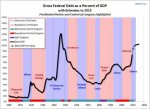Glen Contrarian
DP Veteran
- Joined
- Jun 21, 2013
- Messages
- 17,688
- Reaction score
- 8,046
- Gender
- Male
- Political Leaning
- Progressive
Why? Government paid jobs don't help the economy. The economy needs jobs that can contribute to wealth building. That means private sector.
Really? Then how did we get out of the Great Depression? Remember, all those jobs in our build-up to and during World War II were taxpayer-funded. If government-paid jobs don't help the economy, then instead of getting us out of the Depression, we should have gone deeper into the Depression.

